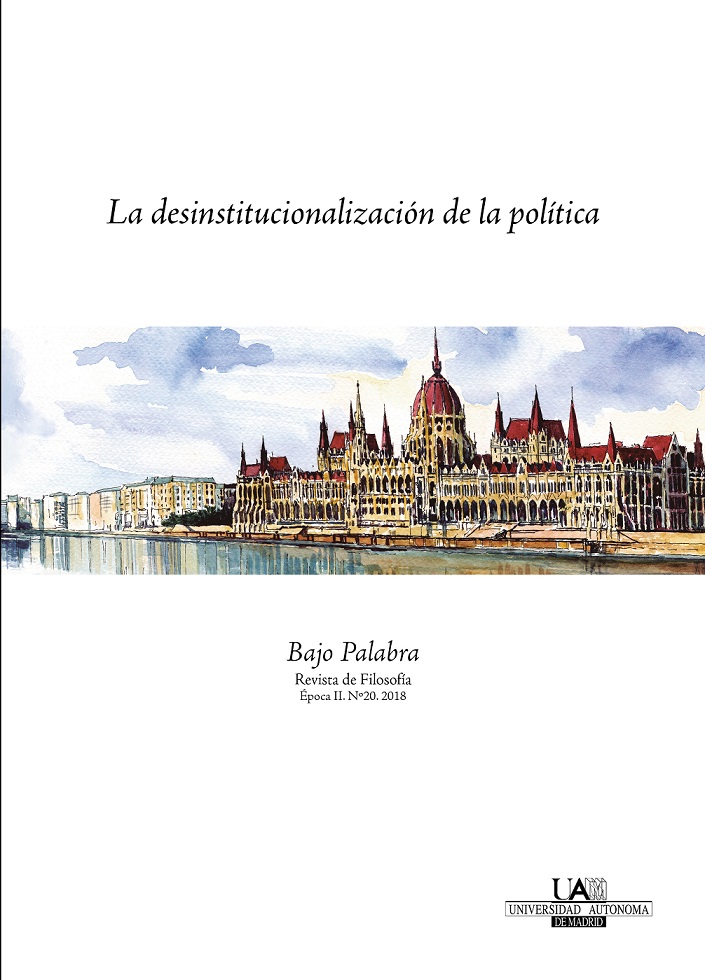In the hills, the cities. Political representation and naturalization of the mandate
Keywords:
Political Representation, Hobbes, A. P. Griffiths, R. Wollheim, M. Foessel, Privacy, IntimacyAbstract
Political representation in Thomas Hobbes is a matter of bare designation. An exercise with language. The basic movement within the body of the Commonwealth is to appoint someone as officer for the people. This theoretical articulation is not sufficiently developed though. The aim of the present text is to profit from the help the four-fold taxonomy on representation by A.P. Griffiths and R. Wollheim offers, and of the ellucidation Michäel Foessel presents around what is intimate before what is private/what is public, as instruments that could shed some light onto the fundamental intuitions Hobbes gathered in his main work, the Leviathan.Downloads
References
BADLEY, L., «Clive Barker Writing (from) the Body», en Writing Horror and the Body: The Fiction of Stephen King, Clive Barker and Anne Rice, Westport, Connecticut-London, Greenwood Press, 1996, pp. 73-104.
BARKER, C., «In the Hills, the Cities», en Books of Blood, vol. I, New York, Berkeley, 1986, pp. 172-210.
BARKER, C., «The Body Politic», en The Inhuman Condition: Tales of Terror, vol. 4 of Books of Blood, New York, Simon & Schuster-Poseidon, 1986, pp. 57-102.
BIRAL, A., «Hobbes: la sociedad sin gobierno», en Duso, G., El contrato social en la filosofía política moderna, Valencia, Leserwelt, 2002, pp. 51-108.
FOESSEL, M., «La trivialisation de l’intime», en Esprit: Comprendre le mon qui vient, Février 2008.
<https://esprit.presse.fr/article/michael-foessel/la-trivialisation-de-l-intime-14411>
FOESSEL, M., La privación de lo íntimo. Las representaciones políticas de los sentimientos, traducción de Jordi Terré, Barcelona, Ediciones Península, 2010.
FRIED, C., Contract as Promise: A Theory of Contractual Obligation, Harvard-MA, Harvard University Press, 1990.
GOODIN, R. E., «Representing Diversity», en British Journal of Political Science, vol. 34, no. 3, 2004, pp. 453-468.
GRIFFITHS, A. P.; WOLLHEIM, R., «How Can One Person Represent Another?», en Proceedings of the Aristotelian Society, Supplementary Volumes, vol. 34, 1960, pp. 187-224.
HOBBES, T., Leviathan, edited with an introduction and notes by J. C. A. Gaskin, Oxford, Oxford University Press, 1998.
HOFFE, O., Thomas Hobbes: Antropologie und Staatsphilosophie, Freiburg, Universitätsverlag, 1981.
HONNETH, A., The Struggle for Recognition: The Moral Grammar of Social Conflicts, translated by Joel Anderson, Cambridge, Polity Press, 2005.
HONNETH, A., Reification: A New Look at an Old Idea, edited by Martin Jay, Oxford, Oxford University Press, 2008.
MALHERBE, M., Thomas Hobbes ou l’oeuvre de la raison, Paris, J. Vrin Librairie Philosophique, 2000.
PITKIN, H. F., The Concept of Representation, Berkeley, Los Angeles – CA, University of California Press, 1972.
